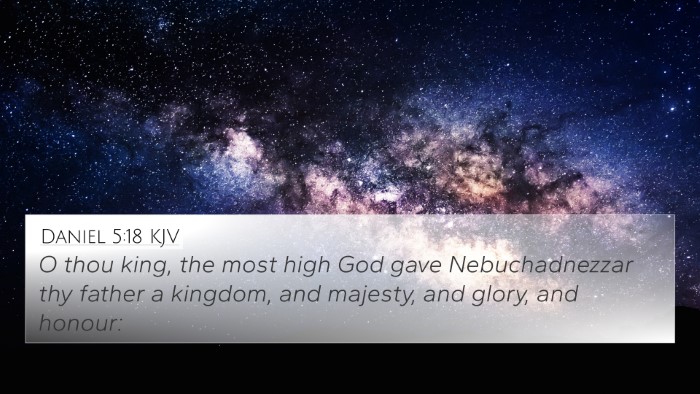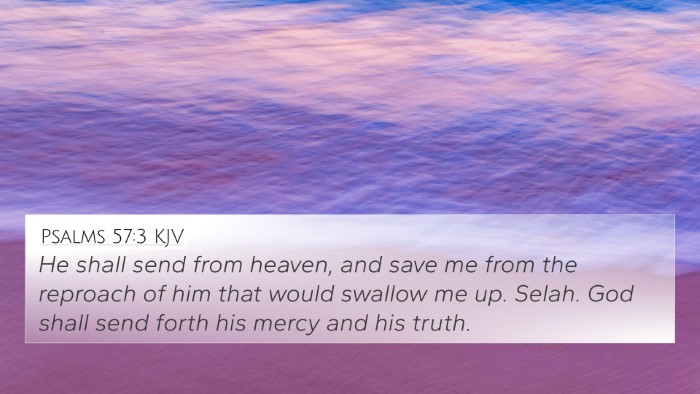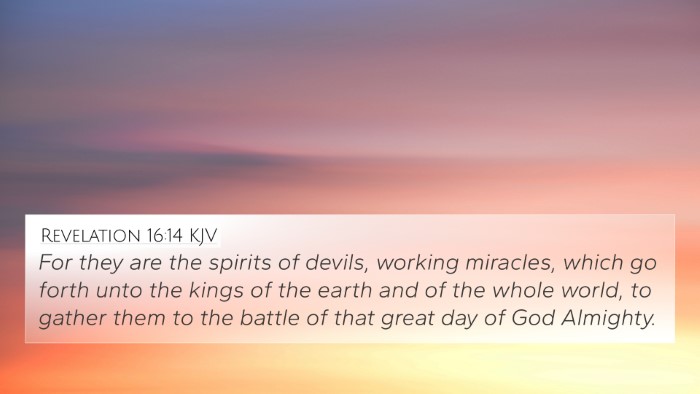Psalms 56:2 reads: "Mine enemies would daily swallow me up: for they be many that fight against me, O thou most High." This verse reflects the psalmist's distress and the overwhelming presence of his enemies. Below, we explore its meaning using insights from public domain commentaries by Matthew Henry, Albert Barnes, and Adam Clarke.
Understanding Psalms 56:2
The psalmist, traditionally attributed to David, is expressing a deep feeling of vulnerability and powerlessness against numerous adversaries. The phrase "daily swallow me up" suggests an ongoing threat, implying that the psalmist feels continuously chased and pressured by his foes. This sense of urgency can resonate with anyone undergoing trials or facing oppression in their life.
-
Matthew Henry's Commentary:
Henry observes the emphasis on the frequency of attacks, noting that the psalmist is under constant siege from numerous enemies. He highlights the emotional toll that such persistent opposition can take on a believer.
-
Albert Barnes' Notes:
Barnes points out that the term "enemies" encompasses various forms of opposition, whether from physical adversaries or spiritual ones. He emphasizes the psalmist's appeal to God, showing a recognition that true strength and deliverance come from divine intervention.
-
Adam Clarke's Commentary:
Clarke notes the invocation of "O thou most High," which acknowledges God's sovereignty and power. He interprets this as a plea for help from the one who is above all earthly powers, reinforcing the idea of divine protection as essential amidst trials.
Cross-Referencing Biblical Texts
This verse can be compared with various other scriptures that deal with the themes of fear, divine protection, and the reality of spiritual warfare. Below are some related Bible verses that offer additional insights:
- Psalm 3:1-3: "Lord, how are they increased that trouble me! many are they that rise up against me." This reflects the same sentiment of feeling overwhelmed by enemies.
- Isaiah 54:17: "No weapon that is formed against thee shall prosper; and every tongue that shall rise against thee in judgment thou shalt condemn." This highlights God’s promise of protection.
- 2 Timothy 4:18: "And the Lord shall deliver me from every evil work, and will preserve me unto his heavenly kingdom." This verse affirms divine deliverance amidst threats.
- Psalm 118:6: "The LORD is on my side; I will not fear: what can man do unto me?" This showcases confidence in God's support even in difficult times.
- Romans 8:31: "What shall we then say to these things? If God be for us, who can be against us?" This reinforces the notion of God’s omnipotence against adversities.
- Psalm 27:1: "The LORD is my light and my salvation; whom shall I fear? the LORD is the strength of my life; of whom shall I be afraid?" This emphasizes reliance on God in fear-inducing situations.
- Proverbs 18:10: "The name of the LORD is a strong tower: the righteous runneth into it, and is safe." This illustrates the safety found in God amidst trouble.
Thematic Bible Verse Connections
The themes of fear, oppression, and divine solace are prevalent throughout the Scriptures. By examining Psalms 56:2 and its connections to other verses, we discern a rich dialogue of assurance amidst adversity. This highlights the importance of cross-referencing Biblical texts to understand the overarching narratives of God’s faithfulness and human vulnerability.
Conclusion
In exploring Psalms 56:2, we are reminded of the struggles that believers may face and the profound comfort that comes from turning to God. The act of cross-referencing these verses not only enriches our understanding but also strengthens our faith, reminding us of the continual presence and support of the divine amidst life’s challenges.
For those engaged in Bible cross-reference studies, this approach provides an invaluable framework for grasping the interconnectedness of the Word. Tools for Bible cross-referencing, such as a Bible concordance or a cross-reference guide, can significantly aid in deepening one's study and understanding of scriptural themes.

















